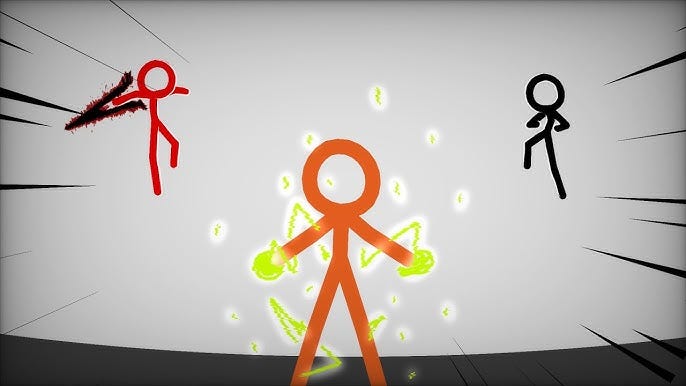Many people compare complicated stories with good ones, often swapping both ideas in the same paragraph. They believe stories must be a complex, intertwined web of closely connected things to be as powerful as narrative masterworks like The Lord of the Rings, War of the Worlds, and The Count of Monte Cristo. They believe the themes must be subtle, the narrative must have complicated characters, and the plot must be detailed.
This is all said over and over in articles, videos, and even people I have conversations with on the art of storytelling despite this belief being disproven over and over again. A golden example of why stories don’t have to be (and, in my opinion, shouldn’t be) complicated is the work of YouTube animator Alan Becker, who inspired me to become an author in the first place.
Alan Becker became internet famous when his short video, Animator vs Animation, was uploaded to Newgrounds and exploded in popularity. It became viral, quickly spreading across tons of different websites. Out of that first short, he created two more sequels, tying up the fun, goofy story of a stick figure trying to escape the confines of his animation software quite nicely. But Becker wasn’t finished there.
Three years later, Becker created a fourth Animator vs Animation video, which introduced five more stick characters. He then had them take on the world of Minecraft in a crossover I didn’t see coming, but it fit like a glove. From there, Becker created all kinds of shorts with the stick figures, all about them messing around with the mechanics of Minecraft and exploring the new possibilities of their world. Each episode was standalone, but that didn’t last.
The Minecraft shorts began to connect, telling a larger, serialized story, each episode expanding on the last and crafting a genuinely fun, entertaining, and heartwarming narrative. Despite the web series having a combined total of maybe four lines of dialogue (none of it coming from the stick figures themselves, unless you count the times Orange spoke with text blocks), I felt a connection with each of the characters. They all had their own personalities and interests. But because the stick figures don’t talk, Becker was forced to come up with creative ways to show their personalities rather than telling us what they were, which he excelled at. He also found interesting and unique ways to visually represent character backstories without relying on flashbacks all the time as seen in the episode Note Block Universe.
Using this experience, Becker developed his style further and created a series of Animator vs Animation shorts that serialized the fifth installment in the series, ending on an emotionally charged final battle that had me worried about a team of stick figures who never said a word. It was the most incredible thing I’ve ever seen on YouTube, mixing creative visual storytelling with a passion for the medium and skills that have been developed for years.
Now, Becker is serializing the next Animator vs Animation installment, which has been a wild ride so far. He and his incredible team have stepped up their game for this one. The visuals have blown me away, and I’m shocked at how far they’ve been able to push stick figure animation and turn it into a storytelling medium in its own right.
Becker’s simple yet deep stories are evidence that your narratives don’t need to be overcomplicated. In fact, simpler is usually better. You don’t want to lose your audience in a web of complicated subplots and shifts in the narrative. Don’t make your stories more complicated than they need to be. Keep it simple, and keep it focused. Write about human emotions that you’ve experienced. Love, loss, loneliness, and acceptance. Center a narrative around those things, or come up with a story and inject it with those themes later. Do whatever you think your story needs. But keep it simple, don’t stress over it, and have fun.
What do you think? Should stories be simple? Or should we make them a little more complex to add depth? Let me know what you guys think in the comments. Thanks for reading!
For a good example of Becker’s work, check out his newest video! It is the perfect display of what I came here to discuss.





What you said is actually what they teach in colleges. The professionals agree with you. I've met several authors on here who think they're above that advice. 😅
It's not that complicated stories are bad. But there is a difference between complexity that serves the plot and confusion about what is actually necessary to include. Our stories should be an iceberg, where our behind-the-scene notes are holding the story up, even though the readers don't directly see them.
And ah yes, I remember the Chosen One battles well, from the early days of YouTube. 😁
Dang! I've enjoyed his work for years but I didn't know there was a larger story. I've never seen the first video you showed.
Excellent article and great examples, I think those push the point home very well.